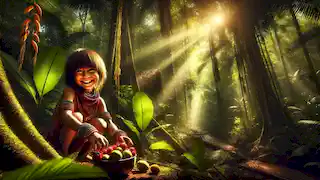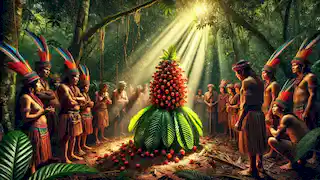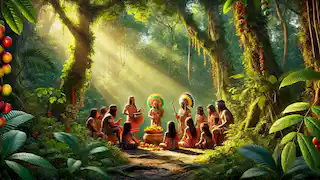The Legend of the Mythical Guarana
Reading time: 7 min

About this story: The Legend of the Mythical Guarana is a Legend from Brazil set in the Ancient This Descriptive tale explores themes of Loss and is suitable for All Ages. It offers Cultural insights. A mythical tale of love, loss, and the powerful spirit within the Amazon’s sacred guarana.
In the heart of the Amazon rainforest, among the towering green canopies and the symphony of birds and animals, lies the mysterious story of the Guarana. Long before the arrival of explorers, settlers, or traders, Indigenous tribes of the Amazon basin revered the guarana plant as a sacred gift from the gods. To them, it was more than just a fruit; it was a lifeforce, a source of strength, and a wellspring of myth and mystery.
The legend of the guarana began in the village of the Maués people, a peaceful tribe known for their wisdom, knowledge of the jungle, and harmonious way of life. The Maués believed that every tree, every river, and every mountain held a spirit and that the gods were always watching, listening, and intervening in the lives of mortals. One plant, however, held a particularly special place in their hearts—the guarana vine.
According to their legends, guarana was born of both joy and tragedy, symbolizing the delicate balance between life and death, happiness and sorrow. The story tells of a time when the gods granted the villagers a miraculous gift and how that gift was lost, only to be reclaimed through love, sacrifice, and a deep connection to the spirit of the land.

The tale began with a young boy, a child whose laughter echoed through the forest and whose heart was as pure as the Amazon waters. He was beloved by all, especially his mother, who was known in the village as a healer, a wise woman, and a storyteller. Her son was her joy, her pride, and her most precious treasure. The boy’s smile was said to bring the sun out from behind the clouds, and his laughter made even the most solemn elders break into grins.
One day, however, tragedy struck. As the boy wandered through the forest gathering fruits and flowers, he encountered a jaguar—an animal both feared and revered. Though he tried to flee, the boy could not escape the swift and powerful creature. His death left a deep sorrow in the hearts of his mother and the entire village. The light that had once illuminated the forest seemed dimmed, as if the jungle itself was mourning his loss.
In her grief, the boy's mother prayed to the gods to bring her son back to her, offering them her life in exchange if only they would return the light to her world. Days passed, and she continued her prayers, crying out to the spirits of the forest and begging for a miracle.
It is said that the god Tupã, moved by her devotion and heartbreak, descended from the heavens to grant her request. But instead of bringing the boy back in his former form, Tupã offered a different kind of gift—one that would keep the spirit of the boy alive and offer his joy and energy to the village forever.
With a wave of his hand, Tupã transformed the boy's eyes into seeds and instructed the villagers to plant them deep in the earth, where his spirit could take root. From those seeds grew the first guarana vine, its fruit small and round, with a dark center that resembled an eye. The villagers saw it as a sign that the boy was watching over them, and they believed that consuming the fruit would grant them his boundless energy and joy.
The First Harvest and the Blessing of Guarana
The guarana vine thrived in the rich soil of the Amazon, growing lush and strong under the careful watch of the villagers. They tended to the plant with the reverence due to a deity, protecting it from harm and harvesting its fruit only with ceremonies and songs. The first harvest was an event of great importance, celebrated with a festival that united the entire village in joyous feasting and dancing.
When they consumed the guarana for the first time, the Maués felt a surge of energy and clarity they had never known. It was as if the boy's spirit was flowing through them, filling them with vitality, courage, and the wisdom of the forest. This newfound strength transformed the village; they became known for their resilience, their agility, and their seemingly endless endurance. Warriors, hunters, and healers all drew from the guarana's power, making the Maués tribe renowned throughout the region.

The Power and the Price
Yet with this gift came a price, for it attracted the attention of other tribes, traders, and explorers from distant lands who sought to harness the power of the guarana for themselves. Rumors spread far and wide of a fruit that could grant strength and vitality, a fruit said to be blessed by the gods themselves. As more and more outsiders arrived, the Maués found themselves defending their land and their sacred plant from those who would exploit it for greed.
The villagers soon realized that the power of the guarana was not to be given lightly. Those who consumed it without reverence or respect found it to be bitter and unkind. Some fell ill, while others lost their way in the forest, unable to find their path back to their villages. The Maués knew this was a sign that the boy’s spirit was still watching over his people, protecting them from those who did not honor the land or its gifts.
In response, the village elders created a sacred ritual for those who wished to partake of the guarana, a test of worthiness that required not only physical strength but also humility and respect for the spirits of the forest. Only those who passed the test could drink the sacred guarana brew, a mixture of crushed seeds, water, and the juice of forest fruits.
As the legend grew, so did the power of the guarana, its reputation spreading across oceans and continents. But the Maués held fast to their traditions, ensuring that the spirit of the boy remained alive and that the gift of the guarana was preserved for those who would cherish it.
Modern Times and the Legacy of Guarana
Centuries passed, and the story of the guarana became a cherished part of Brazilian folklore, a symbol of resilience, energy, and connection to the land. Today, guarana is known worldwide for its stimulating properties, found in energy drinks, herbal teas, and supplements. Yet for the descendants of the Maués and those who honor the old traditions, it remains more than just a source of energy—it is a living link to their ancestors, a reminder of the young boy who brought joy to his people and the mother who loved him so deeply that even the gods were moved.
The Maués continue to celebrate the spirit of the guarana with festivals, songs, and ceremonies. Each year, they gather to honor the boy’s memory, sharing stories of his laughter, his kindness, and his boundless energy. And as they drink the guarana, they feel his spirit within them, a spark of life that transcends time and space, a gift from the gods that endures across generations.
To this day, the Maués say that if you look closely at the guarana fruit, you can see the eye of the boy watching over the forest, reminding all who come to the Amazon of the ancient bond between the people and the land, a bond forged in love, sacrifice, and the eternal spirit of the guarana.

Epilogue: The Spirit Lives On
The legend of the guarana has been passed down through generations, adapted and retold in countless ways. It has inspired songs, dances, and stories, all celebrating the spirit of the Amazon and the resilience of those who call it home. Today, the guarana is more than a legend; it is a symbol of cultural pride, ecological preservation, and the strength that comes from respecting the land and its gifts.
The guarana’s journey from a small Amazonian village to the global stage is a testament to the enduring power of storytelling and the universal appeal of a tale rooted in love, loss, and the enduring spirit of a young boy who became one with the forest.



















